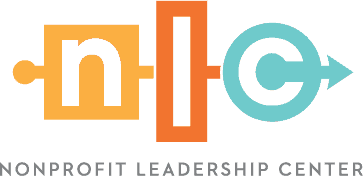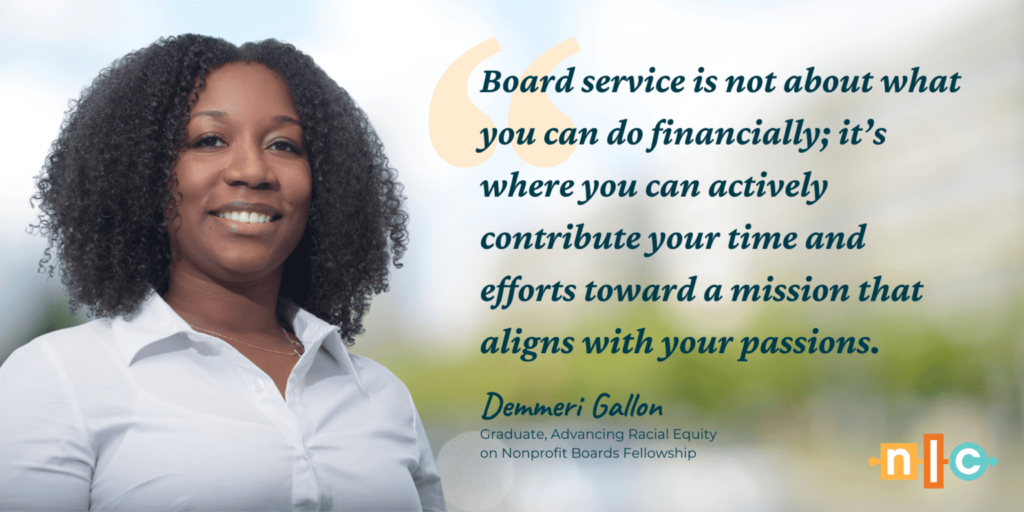Although diverse boards are crucial for nonprofit organizations to be effective, nearly 1 in 3 nonprofits lack any professionals of color on their boards (BoardSource). In 2021, the Nonprofit Leadership Center launched the Advancing Racial Equity on Nonprofit Boards Fellowship to prepare professionals of color to serve on boards and equip nonprofits to foster more inclusive and equitable organizations.
Demmeri Gallon, the Tampa Bay community relations manager for Bank of America, has been a passionate community volunteer for years. As a professional of color, she had never served on a nonprofit board but was yearning to make an even greater difference. Now a graduate of the Advancing Racial Equity on Nonprofit Boards Fellowship, she has found her nonprofit fit and is engaged on a board committee that aligns with her passions.
Demmeri recently sat down with the Nonprofit Leadership Center to share more about her fellowship experience and the impact it has already had on her career and life.
Q: What motivated you to apply for and join the Advancing Racial Equity on Nonprofit Boards Fellowship?
Demmeri: Whether it be swinging a hammer for Habitat for Humanity, restocking the food warehouse at Feeding Tampa Bay or educating local students through Junior Achievement, I’ve been passionate about volunteering in the Tampa Bay community for years. While I’ve greatly enjoyed the variety of my volunteer experiences, I wanted to discover where I could make the most significant impact.
When I first learned about the Advancing Racial Equity on Nonprofit Boards Fellowship, I had not yet served on a nonprofit board. The first step to joining a board can be intimidating, especially knowing that many senior leaders serve on boards and the position requires great responsibility. Applying for this program allowed me to take that first step and identify where my passions aligned.
Q: What did you learn from the fellowship that surprised you or that you didn’t know?
Demmeri: It’s not about what you can do financially; it’s where you can actively contribute your time and efforts toward a mission that aligns with your passions. I also learned that a board position should be a mutually beneficial partnership. Take time to understand the organization behind the mission better and ensure you will receive the experience you desire and deserve.
READ NEXT: Find Your Nonprofit Fit: 10 Questions to Ask Before Serving on a Nonprofit Board
Q: What, if anything, did you learn about yourself after going through the fellowship?
Demmeri: The fellowship helped me focus on my intentionality. I’ve always been passionate about helping kids, but I didn’t know what that meant or exactly what I wanted to do. There are many ways to impact the education landscape, and I couldn’t focus on them all. The fellowship helped me break down my interests into bite-sized steps and decide what issues to focus on so I could be most impactful.
Q: What was a typical training session like during your fellowship?
Demmeri: A typical evening session consists of a three-hour block that starts with an expert speaker and discussion on a highlighted topic, such as board roles and responsibilities, emotional intelligence or finding your fit. We’d then transition into breakout sessions to discuss our thoughts and experiences around the topic more deeply. Finally, we’d come back together for a group conversation about the findings and themes discussed. I loved that we were never asked to follow directions; we created discussions around key points and the experiences we can apply to a board position.
Q: What was it like working with your mentor? What did you learn from her?
Demmeri: In between training sessions, I met with my assigned mentor — an experienced board member who is also a professional of color and has led a nonprofit herself. This allowed me to digest the class curriculum and ask her questions. Her advice and insights allowed me to form both a personal and professional connection that I benefit from to this day.
READ NEXT: How to Be an Effective Mentor in the Workplace
Q: What advice would you give professionals of color interested in being part of the next Advancing Racial Equity on Nonprofit Boards Fellowship?
Demmeri: This is a unique opportunity to learn from an esteemed nonprofit leadership team connected with a plethora of nonprofits throughout Tampa Bay. To have the Nonprofit Leadership Center standing behind you helps create the right connections and opens doors to new board opportunities. Take advantage of that!
Additionally, stay curious and ask questions. Once you graduate, remember that when you have the opportunity to learn something, you also have a responsibility to pass that knowledge on to the next generation.
Q: What guidance or advice would you give to nonprofit leaders struggling to authentically create diverse, equitable and inclusive organizations? How can others effectively use their voice to effect change and ensure equity within their organizations?
Demmeri: I’d suggest that nonprofits look to those who are active participants and be willing to tap them for potential board opportunities. Often, these people don’t have peers in their circle who are on boards, and the thought may have never crossed their minds.
READ NEXT: 8 Things Leaders Who Authentically Embrace DEI Believe
Q: What should coworkers and supervisors know to best support fellows going through the program?
Demmeri: Fellows should leverage coworkers on boards to form a complete picture of the board experience. Supervisors should allow employees to get involved because board service develops personal and professional skills.
Q: Have you joined a board since graduating from the fellowship?
Demmeri: I have joined a board committee at the Hillsborough Education Foundation. This committee participation is part of my testing period to ensure the program is aligned with what I want to do.
Q: If you could only use three words to describe your experience in the fellowship, what would they be?
Demmeri: Learn, teach, advocate.

